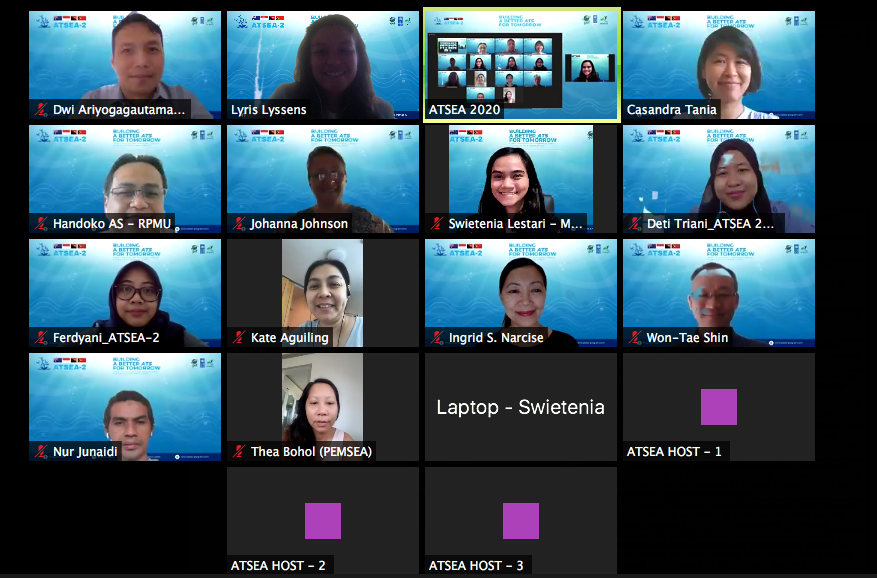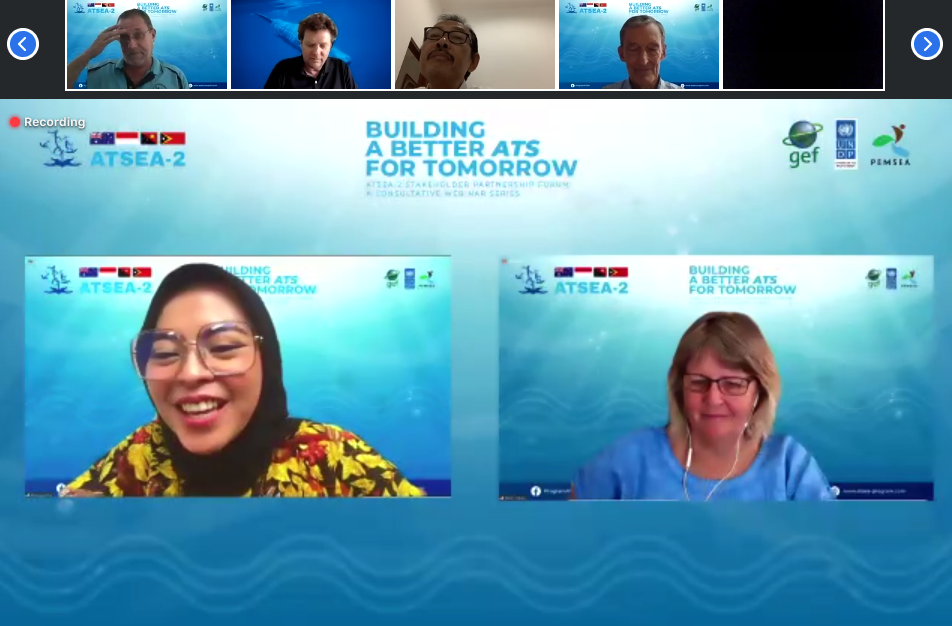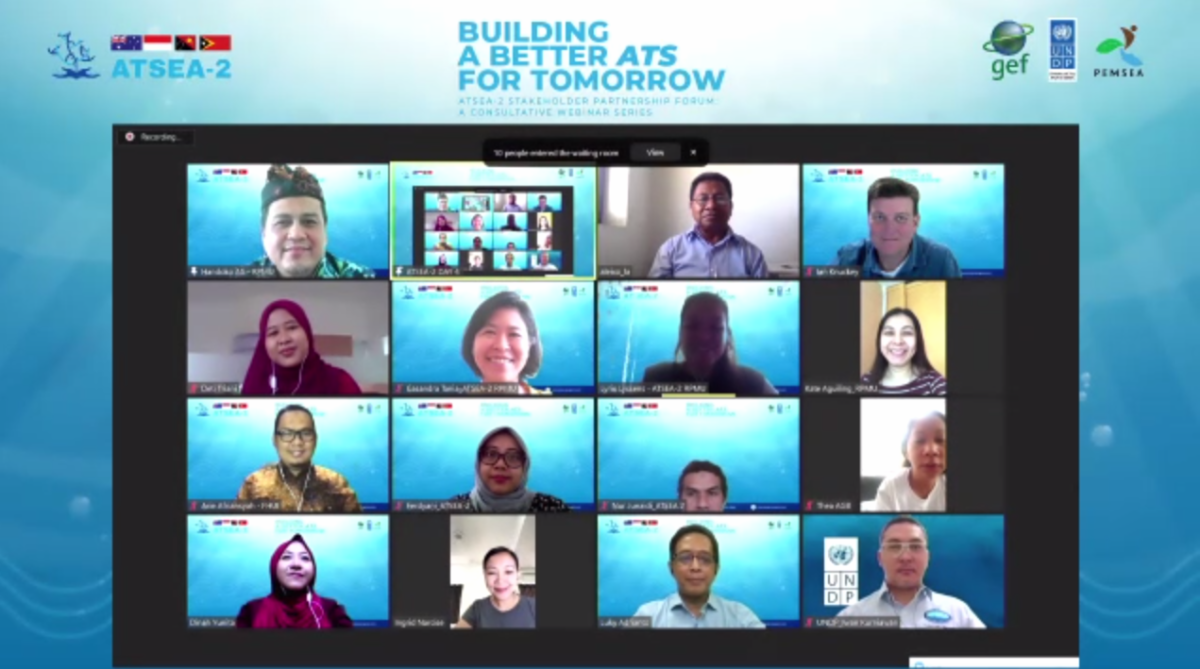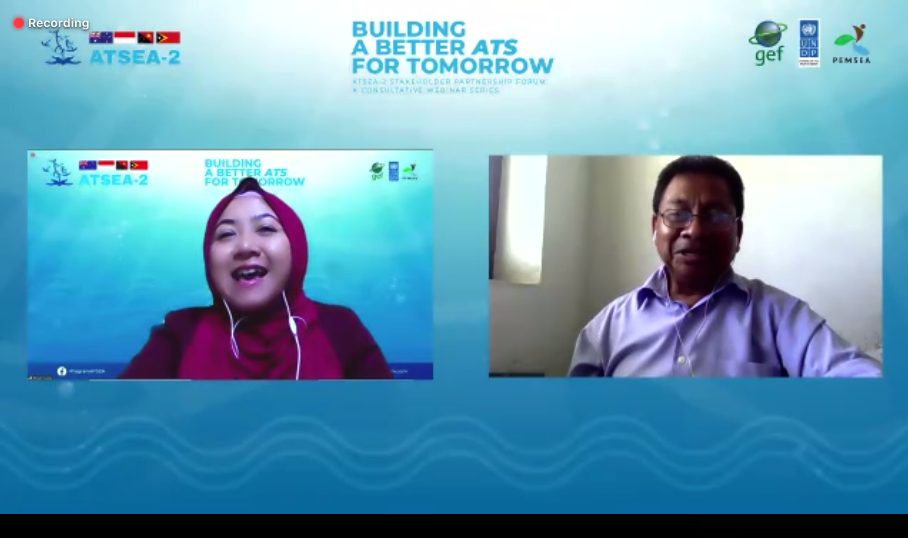During the first week of November 2020, the ATSEA program held a four-day public consultative webinar series where various experts in the field of marine and coastal sciences presented preliminary assessments and research results that would contribute to the Strategic Action Plan (SAP) of the Arafura and Timor Seas (ATS) region. Four thematic discussions were divided between the days that included presentations from ATSEA consultants, commentary sessions from a board of expert panelists, and a different moderator each day guiding the webinar.
The webinar series also served as a platform for the public and stakeholders of the ATS region to participate in the thematic discussions and to provide feedback and inputs to the establishment of the Stakeholder Partnership Forum (SPF). The SPF aims to strengthen participatory mechanisms in ATS governance through engagement of a broad array of stakeholders and members in the region on various issues such as the ones presented on the webinar series: Building a Better ATS for Tomorrow.
The theme of the first day – Towards a Stakeholder Partnership Forum – featured presentations from Dr. Tonny Wagey, ATSEA’s phase 1 project manager, and Dr. Lida Pet-Soede on behalf of PT Hatfield Indonesia, consultant for the development of a governance mechanism for the ATS region. The discussions highlighted the need to build on country commitments under the 2014 Minister Declaration and existing network of partners and collaborators, while considering lessons learned from other areas in developing functional and practical mechanisms that will be able to provide guidance and nurture cooperation in addressing priority concerns within the ATS region.
The second day featured themes on Climate Change and Marine & Land-based Pollution, with presentations from Dr. Johanna Johnson from C20 Pacific and Dr. Won-Tae Shin of Global Ocean Inc. respectively. This day highlighted the importance of developing recommendations and guidelines that will be useful for climate change adaptation interventions at the regional as well as community levels, and developing cooperation on oil spill preparedness and response as well as establishing a marine debris survey network in the region.

Credit: ATSEA-2
On the third day, Dr. Alison Green from the Red Sea Research Center and Dr. Nicolas Pilcher from the Marine Research Foundation presented their findings and preliminary recommendations on the theme of Biodiversity Protection in the region. Their presentations highlighted the importance of stakeholders being fully engaged and understanding the value of MPAs and MPA networks, as well as developing a Regional Action Plan for marine turtles in the ATS region, a subject that is still under-researched.

Credit: ATSEA-2
On the last and fourth day of the webinar series, for the theme on Sustainable Fisheries, Dr. Arie Afriansyah from the faculty of law at Universitas Indonesia and Dr. Ian Knuckey from Fishwell Consulting presented their outputs on IUU Fishing and Ecosystem Approach to Fisheries Management respectively. They specifically discussed the issues of collecting data on unreported and unregulated fishing in the region, as well as incorporating fisheries co-management and how EAFM of shared stocks such as the red snapper can be implemented across countries whilst sharing responsibilities. It was pointed out that local wisdom, clear legal framework, law enforcement, monitoring systems, and law enforcement in collaboration with fishers, community, and government would guarantee the fisheries’ sustainability.
Credit: ATSEA-2
Throughout the four-day consultative series, speakers and panelists were able to have fruitful discussions with the public and potential members of the SPF that reinforce the need to further develop and create a participatory ecosystem to ensure that latest data and information about the region is shared and serve as the basis for an inclusive sustainable management of marine and coastal activities in the ATS. With this in mind, the ATSEA project is currently refining the design and guidelines for the SPF to ensure its effective contribution to the sustainable development of the ATS region currently accepting key stakeholders of the ATS region to be a part of the SPF to ensure that best practices are utilized for the future development of the ATS.
The full four-day webinar series proceedings can be found on this link.



